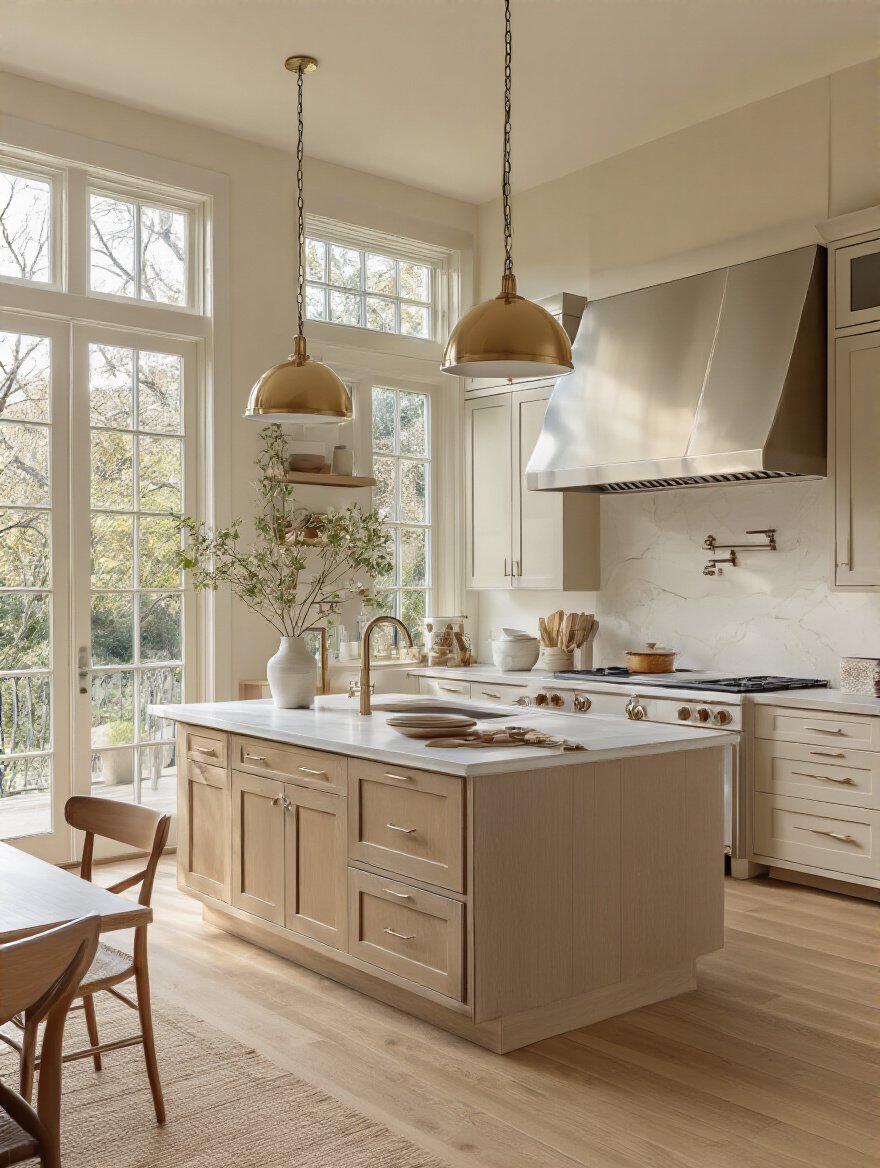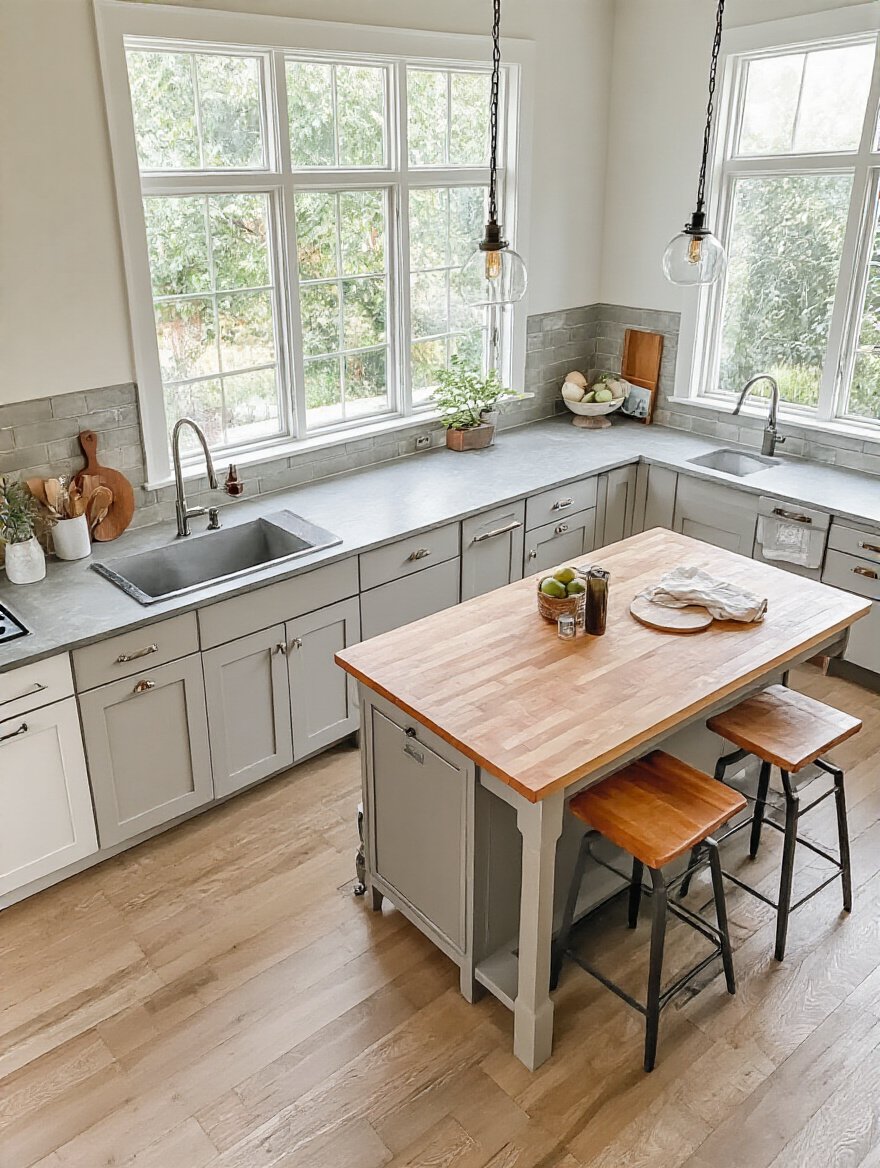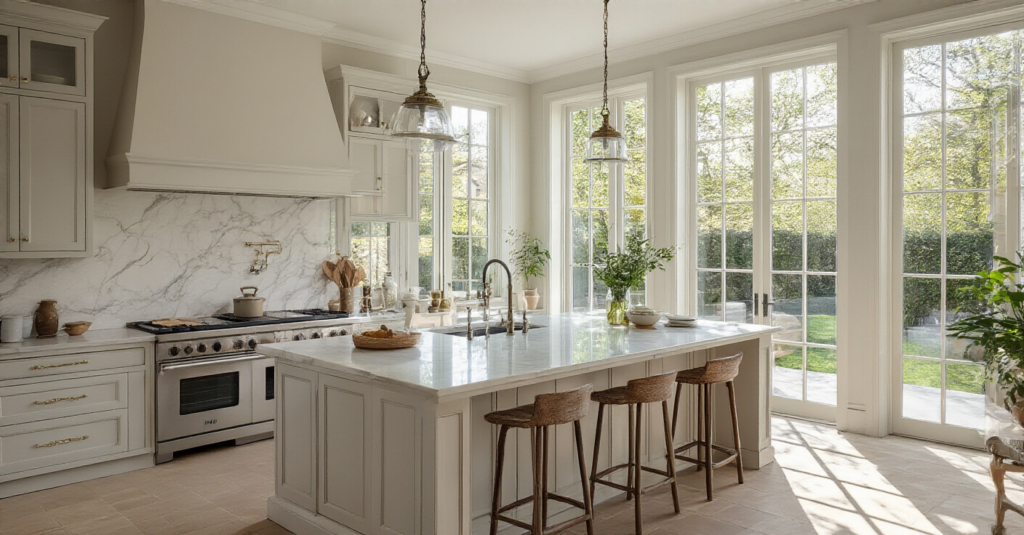You know the question people always ask me? It’s not about the trendiest tile or the most expensive oven. It’s “Where should my island go, and what should it do?” And that, right there, is the heart of the matter. Because your kitchen island is the unsung hero—or villain—of your daily well-being. It can be a source of constant, low-grade stress, a bottleneck that makes you sigh every time you have to squeeze past it. Or, it can be the place where your entire home’s energy converges in the most beautiful way.
I’m here to tell you that the secret to a great kitchen island has very little to do with how it looks on Pinterest and everything to do with how it makes you feel. A truly brilliant island isn’t just a block in the middle of your kitchen; it’s an anchor for your health, your connection, and your happiness. So, let’s talk about how to get it right.
Foundations & Planning: Your Island’s Soul
Before you even think about quartz versus granite, we need to talk about the invisible stuff. The flow, the energy, the purpose. Nailing this foundation is the difference between a kitchen that works for you and one that you’re constantly fighting against. This is where the magic really happens.
1. Feel Out Your Kitchen’s Natural Flow
Forget the tape measure for a second. The most important first step is understanding the energy and movement of your space. A poorly placed island is like a boulder in a stream—it creates constant, tiny frustrations that add up, day after day, subtly raising your stress levels. We’re not just aiming for an “efficient work triangle”; we’re designing for a sense of effortless ease.

I tell every single one of my clients to do this: get some cardboard boxes and tape them together to create a rough mock-up of your potential island. Live with it for two or three days. Walk around it, open your oven and dishwasher doors, pretend to carry in groceries. How does it feel? Do you feel generous and open, or do you feel constricted and trapped? Your body will tell you the truth long before a floor plan will. This isn’t just about avoiding bumps and bruises; it’s about protecting your peace.
The real goal here is to create pathways that feel intuitive, not frustrating. Your home should support your movement, not block it.
2. Give Yourself Room to Breathe with the Right Dimensions
Now you can grab the tape measure. The industry standard says you need at least 42 inches of clearance around an island, and that’s not just some arbitrary number. It’s the minimum amount of space required for your body and mind to feel at ease. Anything less and your nervous system registers “cramped,” making you feel subconsciously on-guard. In a home with two cooks or kids running around, 48 inches is even better.

Think about pulling a hot pan from the oven. You want to be able to step back without hitting something. You want two people to be able to pass each other without turning sideways and doing that awkward shuffle. This isn’t just a matter of convenience; it’s a matter of psychological comfort. Proper clearance makes your kitchen feel more generous, more welcoming, and profoundly safer for everyone, from toddlers to grandparents.
So when you’re deciding on dimensions, your first priority is preserving that breathing room. The island should serve the space, not dominate it.
3. Choose Its Form: Fixed, Movable, or Peninsular?
This decision is less about style and more about the kind of energy your life requires right now. A big, fixed island is an anchor. It’s grounding, permanent, and creates a powerful sense of stability. It says, “This is the heart of our home, and it’s here to stay.” This is perfect if you crave routine and a solid, dependable hub for your family. It’s where you can confidently install a sink or cooktop because you know it’s a permanent fixture.

A movable island, or even just a beautiful cart, is all about flexibility and flow. It honors the fact that life changes. Sometimes you need more floor space for a party; other times you need a rolling baking station right next to the oven. A movable island gives you permission to adapt your environment to your immediate needs, which can be incredibly liberating. And a peninsular island, which is attached to a wall, is a brilliant solution for smaller spaces, defining the kitchen area without completely closing it off, keeping the feeling open and connected.
There’s no “right” answer. Ask yourself: Does my life need more grounding stability or more adaptive flexibility right now?
4. Define Its True Purpose: Connection, Creativity, or Calm?
Here’s where everyone goes wrong. They try to make the island do everything—it’s a prep station, a dining table, a homework hub, a bar, a storage unit. The result? A cluttered, chaotic block that excels at nothing and becomes a magnet for stress. I once had a client who was so frazzled by her “everything island” that she couldn’t even stand to be in her own kitchen.

A truly successful island has one primary purpose, and its other functions gracefully support that main goal. Before you design anything, decide what that one thing is. Is its main job to foster connection? Then prioritize comfortable seating and an open feel. Is it about nurturing your creativity? Then focus on a huge, uninterrupted prep surface and point-of-use storage for your tools. Or is its purpose to bring a sense of calm and order? Then make clever, concealed storage the hero.
“A truly successful island has one primary function, with secondary functions gracefully complementing it. Without a defined purpose, you end up with an expensive block that doesn’t fully serve any need well.”
This clarity is the single most important shortcut to an island you will love for years.
5. Invest in What You Touch
Let’s talk money. Your budget isn’t just a number; it’s a reflection of your values. I’ve seen people spend a fortune on a fancy waterfall edge but cheap out on the drawer slides, which means they spend the next 10 years fighting with sticky, clunky drawers. That’s a daily dose of irritation you don’t need.

My advice is always to allocate your budget to the things your body interacts with every day. Invest in a countertop material that feels good to the touch and supports your health—like a cool, solid quartz that’s non-porous and won’t harbor bacteria. Invest in high-quality drawer glides and cabinet hinges that operate smoothly and silently. Invest in a faucet that feels substantial in your hand. These are the sensory details that contribute to your feeling of well-being. A beautiful space with cheap, flimsy touch-points feels inauthentic and unsatisfying on a subconscious level.
That’s the real ROI: a space that feels as good as it looks, every single day.
Optimizing How Your Island Works for You
Now that we have the soul of the island figured out, let’s get into the practical magic. A well-designed island can streamline your life, reduce your mental load, and make the daily rhythm of cooking and cleaning feel less like a chore and more like a graceful ritual.
6. Give Everything a Home with Dedicated Storage
Good storage isn’t about how much stuff you can cram in; it’s about reducing your mental load. Every time you have to search for the whisk or move a stack of bowls to get to the one you need, your brain expends a little bit of energy. That’s clutter, and visual clutter is a scientifically-proven source of stress. The solution is creating an effortless system where everything has a logical, intuitive home.

Deep drawers for pots and pans should be right across from the stove. A narrow pull-out for spices and oils should be right next to your prep zone. A drawer with vertical dividers for baking sheets is a game-changer. By designing storage for the way you actually cook, you create a space that anticipates your needs. Things are simply there when you reach for them. This creates a flow state in the kitchen, turning chaos into calm.
When you give every item a designated home, you give your mind a break.
7. Integrate Appliances to Support Your Body
This is where wellness architecture really shines. We’re not just plugging in appliances; we’re placing them in a way that honors your body and reduces physical strain. Bending down to use a low microwave is terrible for your back. Installing a microwave drawer in your island at waist height is a simple ergonomic shift that makes a world of difference.

A small prep sink in the island is one of my non-negotiable recommendations for anyone who loves to cook. It saves hundreds of steps back and forth to the main sink, reducing fatigue. It also creates a hygienic zone for washing produce, separate from the main sink where dirty dishes might be lurking. This isn’t about luxury; it’s about creating a kitchen that is kind to your body over the long haul.
Every choice should ask: Does this make the work of nourishment easier and more joyful?
8. Design for Real Connection with Integrated Seating
An island with seating can become the modern-day hearth—the central spot where everyone naturally gathers. But so often, it’s designed poorly. A shallow 10-inch overhang forces people to sit sideways, and barstools without back support make them want to leave after five minutes. If you want to foster genuine connection, you have to design for comfort.

Ensure you have a generous overhang—at least 15 inches—so people can comfortably tuck their knees under. Choose stools that are the right height and, if possible, have some form of back and foot support. These details encourage people to linger, to have longer conversations, to connect face-to-face while you cook. It transforms the island from a simple eating bar into a true hub of family life.
Your design choices can either invite connection or create subtle barriers to it. Choose connection.
9. Create a Digital “Off-Switch” with Hidden Charging
Visual clutter from cords and devices is a huge source of mental static. Your kitchen counter should be a place for nourishment, not a graveyard for half-charged iPads and tangled cables. A hidden charging station isn’t just about tidiness; it’s about creating sacred, tech-free space.

Installing a dedicated charging drawer with built-in outlets is my favorite solution. When the drawer is closed, the technology is out of sight and out of mind. It creates a ritual of “putting your devices to bed” so that you can be more present. This simple act reclaims the island as a place for human-to-human interaction and food, not for scrolling.
It’s a powerful way to set a boundary with technology and preserve the calming energy of your kitchen.
10. Make Cleanup Mindful with Smart Waste Systems
Let’s be honest: a smelly, overflowing trash can is the fastest way to ruin the vibe in a beautiful kitchen. Integrating your waste and recycling into the island isn’t just about hiding it; it’s about making the entire cleanup process more mindful and hygienic.

A pull-out system with separate bins for trash, recycling, and even compost makes sorting effortless. It keeps odors contained and germs off your countertops. My pro tip is to find a system with a hands-free option, like a foot pedal or touch-to-open mechanism. This is incredibly helpful when your hands are messy from food prep. This small detail turns a constant annoyance into a seamless, clean part of your kitchen rhythm.
By making it easy to do the right thing, you reduce friction in your daily life.
11. Add a Prep Sink for a More Ritualistic Cooking Flow
I know I mentioned this before, but it’s worth its own point. A small, dedicated prep sink on the island elevates the act of cooking. It creates a beautiful, self-contained zone for all the “clean” work—washing vegetables, rinsing herbs, filling a pot with water. This mentally and physically separates the act of creation from the act of cleaning up.

When you’re not working around a pile of dirty dishes in the main sink, the process of preparing a meal feels more like a creative ritual and less like a chaotic race. This small feature can have a profound impact on how much you enjoy cooking. It’s a pocket of calm in what can often be a busy space.
It’s an invitation to slow down and be more present with your food.
12. Use Light to Support Your Body’s Natural Rhythms
If you only listen to one piece of my advice, let it be this: lighting is everything. The lighting over your island directly impacts your energy, mood, and sleep. So many people install trendy, decorative pendants that look great but cast terrible, shadowy light—it’s a recipe for eye strain and kitchen accidents.

You need to layer your lighting. First, you need excellent, focused task lighting directly over your work surfaces. This could be from well-placed recessed lights or pendants that actually direct light downward. And critically, all of your island lights must be on a dimmer. This allows you to have bright, energizing light (closer to daylight) while you’re prepping, and soft, warm, ambient light (like a sunset) as you’re winding down in the evening. This supports your natural circadian rhythm, telling your brain when it’s time to be alert and when it’s time to relax.
Your kitchen lighting is a powerful wellness tool. Use it wisely.
Elevating Your Island’s Style and Spirit
Functionality and wellness are the foundation, but beauty is what makes a space sing. This is where we infuse your island with personality and soul, using materials and design choices that resonate on a deeper level.
13. Choose Countertop Materials That Feel as Good as They Look
The material you choose for your island countertop is a sensory experience. You’ll touch it dozens of time a day. It should feel good. Natural materials like stone or wood have a grounding quality that plastic laminates just can’t replicate. They connect us to the earth and bring a sense of organic calm into our homes. This is the essence of biophilic design—our innate need to connect with nature.

From a health perspective, I almost always recommend engineered quartz. It’s non-porous, meaning it won’t harbor bacteria, viruses, or mold, and it’s incredibly durable and easy to clean without harsh chemicals. It gives you the look and substantial feel of stone while providing peace of mind. Whatever you choose, get a physical sample. Feel it, look at it in your home’s light, and see how it speaks to you.
The surface you interact with most should be one that supports your well-being.
14. Use Color to Shape Your Kitchen’s Mood
Color is not just decoration; it’s a form of energy that has a measurable effect on your mood. The island is the perfect place to be intentional with color. A big, white kitchen can sometimes feel sterile, but painting the island a deep, calming blue or a rich, grounding forest green can completely change the room’s emotional temperature.

Think about the feeling you want to cultivate in your kitchen. Do you want it to feel energetic and joyful? Maybe a warm, sunny yellow is right. Do you want it to be a place of serene focus? A soft, earthy neutral or a sophisticated charcoal might be perfect. Don’t just follow a trend; choose a color that resonates with the emotional landscape you want to create in the heart of your home.
This is your opportunity to paint with feeling.
15. Showcase Your Story with Open Shelving
Open shelving on an island can be a beautiful thing, but here’s the secret: it’s not for everyday dishes. It’s for showcasing your soul. This is the place for things that tell your story and connect you to what you love: your favorite cookbooks, handmade pottery from a local artist, a collection of small plants, a beautiful wooden bowl.

These items add personality and life, making your kitchen feel uniquely yours. Displaying plants is especially powerful, as greenery is proven to reduce stress and improve air quality. Just be ruthless about curating it. The goal is a soulful display, not a cluttered shelf. If it doesn’t bring you joy or tell a story, it doesn’t belong here.
This turns your island into a living piece of art that reflects who you are.
16. Layer Lighting Like Jewelry for the Room
Think of your lighting fixtures as the jewelry of your kitchen. The pendants or chandelier you hang over your island make a powerful style statement. This is a chance to add a sculptural, artistic element to the space. But remember our talk about layers—these fixtures are just one piece of the puzzle.

They provide the aesthetic sparkle and ambient glow, but they must be supported by functional task lighting. And as I said before—and will say again because it’s that important—put everything on a dimmer. A beautiful fixture that’s too bright is just as bad as a dim, shadowy one.
Good lighting should make your kitchen both function beautifully and feel magical.
Pushing the Boundaries: Next-Level Island Concepts
If you’re ready to move beyond the basics, an island can become a truly dynamic and innovative feature. These concepts integrate nature, technology, and adaptability to create a kitchen that is truly ready for the future.
17. Design a Multi-Level Island for a More Dynamic Life
A multi-level island is a brilliant way to create different functional and energetic zones in one footprint. This is ergonomics in action. A standard 36-inch height is perfect for standing prep work. A lower, 30-inch table-height section is far more comfortable for sitting, eating, and connecting. A higher, 42-inch bar-height level can serve as a great standing desk or a place for guests to lean and chat.

This design encourages movement and different postures throughout the day, which is fantastic for your physical health. It also visually delineates zones for “work” and “rest,” helping to mentally separate tasks. It allows multiple activities—homework, cooking, casual conversation—to happen simultaneously without feeling chaotic.
This is designing a space that adapts to the full spectrum of your family’s life.
18. Add Rolling or Extendable Parts for Breathing Room
In our modern lives, flexibility is a form of wellness. An island with a built-in extendable countertop or a nesting rolling cart gives you the ability to expand and contract your space as needed. For most of the week, it’s a compact, efficient workstation. But when you’re baking for the holidays or hosting a party, you can pull out an extra surface and suddenly have all the room you need.

This is particularly transformative in smaller homes. Instead of being constrained by fixed furniture, you have a kitchen that can breathe and adapt to the occasion. It’s a way of future-proofing your space, ensuring it can serve you well through all of life’s different seasons and events.
It’s about giving yourself options and the freedom to change.
19. Bring Life Indoors with an Island Herb Garden
This is one of my favorite wellness features. Integrating a small herb garden directly into your island is the ultimate expression of biophilic design. It’s not just about having fresh basil for your pasta; it’s about bringing a living, breathing element into the very center of your home.

The sight and smell of fresh herbs are proven to reduce stress and boost your mood. The act of tending to them is a mindful, grounding ritual. And, of course, the taste and nutritional value of fresh-cut herbs are far superior to anything you can buy. Whether it’s a simple trough with pots or a more advanced hydroponic system, an island garden nourishes you on every level—body, mind, and spirit.
This literally makes your island a source of life.
20. Weave in Tech That Actually Reduces Your Mental Load
Smart tech in the kitchen can either be another distraction or a powerful tool for calm and efficiency. The key is to be incredibly intentional. The goal is “invisible tech” that serves you, rather than demanding your attention.

A discreet smart display that can show you a recipe without you having to touch a screen with messy hands? That reduces friction. A voice-activated speaker that can set timers, add to your grocery list, and play calming music while you cook? That reduces your mental load. But a giant screen flashing news updates while you’re trying to have a conversation with your child? That’s the opposite of wellness.
Choose technology that simplifies your life and helps you be more present, not more distracted.
Your Island, Your Sanctuary
As you can see, a kitchen island is so much more than a countertop and some cabinets. It’s a powerful tool for shaping your daily experience. It’s an investment in your family’s connection, your physical ease, and your mental peace. By approaching its design with intention—focusing on flow, feeling, and function first—you can create a centerpiece that truly nourishes your life.
Don’t get lost in the endless scroll of pretty pictures. Come back to these core principles. Think about how you want to feel in your home, and then design an island that supports that feeling. Whether it’s a hub for joyful gatherings, a serene station for creative cooking, or a smart, efficient command center, the perfect island is the one that makes your life better, simpler, and happier. It’s time to create the brilliant, beating heart your home deserves.






